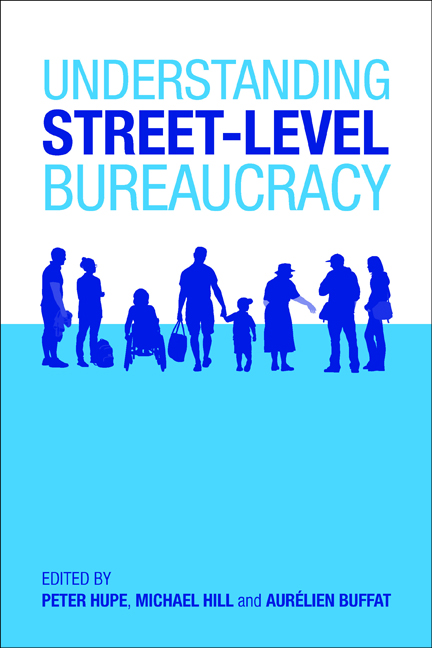Book contents
- Frontmatter
- Contents
- Biographical notes
- Preface
- Part One Introduction
- Part Two Delivering services and benefits: street-level bureaucracy and the welfare state
- Part Three Agents of the state: street-level bureaucracy and law enforcement
- Part Four Embedded in society: street-level bureaucrats as public actors
- Part Five The management of street-level bureaucrats
- Part Six The promise of professionalism
- Part Seven Conclusion
- References
- Index
Ten - ‘Playing the rules’: discretion in social and policy context
Published online by Cambridge University Press: 08 March 2022
- Frontmatter
- Contents
- Biographical notes
- Preface
- Part One Introduction
- Part Two Delivering services and benefits: street-level bureaucracy and the welfare state
- Part Three Agents of the state: street-level bureaucracy and law enforcement
- Part Four Embedded in society: street-level bureaucrats as public actors
- Part Five The management of street-level bureaucrats
- Part Six The promise of professionalism
- Part Seven Conclusion
- References
- Index
Summary
Introduction
Many researchers who turn to the street-level bureaucracy literature are concerned about policy variation and how to manage the frontline workforce of the state to secure policy fidelity. In earlier work, we have depicted this prevailing grain of research as the ‘state-agent’ or implementation–control–discretion narrative (Maynard-Moody and Musheno, 2000; 2003, pp 4, 9–24). Our work over the last 15 years has challenged the singularity, but not the importance, of this narrative and, instead, focused on an empirical rendering of front-line work and the implications of theorising this work accurately for a democratic polity. It is important to stress, as we did in the conclusion of Cops, teachers, counsellor (Maynard-Moody and Musheno, 2003, p 156), that frontline workers ‘cannot reject the state-agent role and the demands and tensions it brings to their work. [They] cannot shed the responsibility that comes with the state-assigned power over others’. Aware of the salience of the state-agent narrative, but pushing beyond it, our work carries forward the foundational purpose of street-level bureaucracy inquiry and theory: to understand the work of public employees who interact directly with the citizenry and ‘mediate … the constitutional relationship of citizens to the state’ (Lipsky, 2010, p 4). Here, we pursue two questions: (1) ‘How do our earlier empirical findings about the judgements of front-line workers square with theoretical renderings of culture, agency and structure?’; and (2) with a focus on the worker as agent and drawing upon our current fieldwork, ‘How does “playing the rules” produce both local equities and inequities?
Discretion on the front lines of governing has been, and remains, a dominant frame in street-level bureaucracy and policy implementation research. Research within this frame has produced, and may continue to produce, important new insights into policy and governance (for reviews, see Hupe and Hill, 2007; Maynard-Moody and Portillo, 2010). However, like all frames, the discretion frame has drawn attention to certain issues, while others have remained largely outside the gaze of this scholarly discourse. We argue that the concept of ‘discretion’ inadequately and incompletely represents the central referents that shape front-line worker judgements and stands in the way of imagining a path for reconciling judgements with social justice and a democratic ethos that demands transparency and accountability.
- Type
- Chapter
- Information
- Understanding Street-Level Bureaucracy , pp. 169 - 186Publisher: Bristol University PressPrint publication year: 2015
- 1
- Cited by



